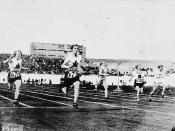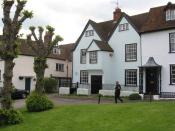"Lord of the Flies" was William Golding's first published novel and since its appearance in 1954 it has become one of his best known works. It is commonly said that it shows how thin is the veneer of civilization and how readily we humans can return to the state of primitive savages or animals and once again become blindly destructive. I read the novel recently for the first time, and I was struck by how similar were the processes depicted in the story to those I have experienced in my work as a psychoanalyst. I would like to make use of Golding's novel to discuss some of the psychoanalytic ideas about the nature of human destructiveness.
The problem.
Golding has described some of the background to his novel in an essay entitled Fable (Golding, 1965):
"Before the second World War I believed in the perfectibility of social man; that a correct structure of society produced goodwill; and that therefore you could remove all social ills by a reorganization of society.
It is possible that I believe something of the same again; but after the war I did not because I was unable to. I had discovered what one man could do to another. I'm not talking of one man killing another with a gun, or dropping a bomb on him or blowing him up or torpedoing him. I am thinking of the vileness beyond all words that went on, year after year, in the totalitarian states. They were not done by the headhunters of New Guinea, or by some primitive tribe in the Amazon. They were done, skillfully, coldly, by educated men, doctors, lawyers , by men with a tradition of civilization behind them, to beings of their own kind. I must say that anyone who moved through those...


